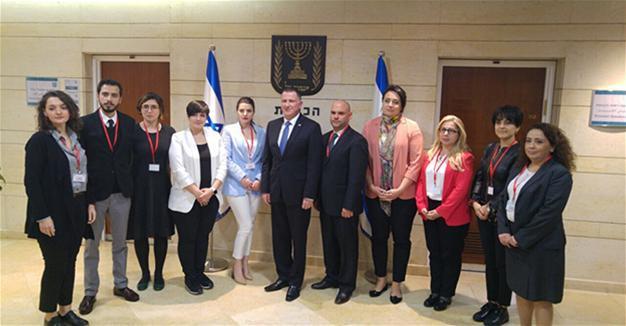Turkey, Israel to work on practical issues at first, says Knesset head
Deniz Çiyan - JERUSALEM

Turkey and Israel should begin focusing on practical issues as they repair their relationship following a six-year hiatus due to the Mavi Marmara massacre, Israel’s parliamentary speaker has said, adding that focusing on issues that divide the two nations at the outset would lead nowhere.
“I would strongly suggest that in the initial stage [cooperation between Turkey and Israel] should be around practical issues because in any meeting of parliamentarians, I don’t think that a very serious … argument about issues that divide us will lead to practical solutions,” Knesset Speaker Yuli-Yoel Edelstein told a group of Turkish journalists on March 6.
“But once we try to cooperate we can have legitimate differences and issues,” he told the journalists, who were staging the first such visit to Israel since the two countries began normalizing their relationship in mid-2016. “The roadmap is about building platforms on practical issues that we can work on.”
Turkey and Israel reached a rapprochement deal last year after six years of strained ties due to an Israeli commando raid on the Mavi Marmara flotilla that killed 10 Turkish citizens as they attempted to bring aid to Gaza.
Edelstein said that although there was a Turkey-Israeli friendship group in the Knesset, there was no similar group in the Turkish parliament.
He also invited the Turkish speaker of parliament, İsmail Kahraman, to Israel, while also saying he would be happy to visit Ankara if an invitation is extended.
Commenting on the Syrian issue, Edelstein said both Turkey and Israel are neighbors to the same turmoil in the country and that the two countries were both interested in the stability of the region.
“Yes, there could be tactical differences and approaches, but in terms of the end game, both countries are interested in stability,” Edelstein said, adding that both Turkey and Israel wanted to see the end of the massacres in Syria and, in Turkey’s case, a decrease in the amount of refugees arriving in the country.
“It’s about possible solutions, not ideal solutions,” he said, stating that Israel and Turkey had to “strategically address regional issues.”
“There will obviously be difference of approach, [but] the end result should be acceptable to all players,” Edelstein said.
‘Global responsibility’ on terror
The head of the Turkey-Israel friendship group in the Knesset, Mickey Levy, said there was a global responsibility to fight terror and that Syrian President Bashar al-Assad could not do anything on his own, obligating other states to sit down and reach an agreement.
When asked about Turkey possibly having a different view than Israel on the future of Jerusalem, Levy, a Jew with roots in the southeastern Anatolian district of Cizre, said that if “Turkey wants to talk only about Jerusalem, there is no way.” “Jerusalem belongs to the Jewish people,” Levy added.
‘No anti-Semitism in Turkey’
Tzachi Hanegbi, a minister of regional cooperation and acting minister of communications, told the group of Turkish journalists that there was no anti-Semitism in Turkey.
“There is no indication that [the Jewish community in Turkey] don’t feel safe in Turkey. They are tense like all Turkey inhabitants, Muslim or Jew, but they are comfortable with the fact that there is no anti-Semitism in Turkey whatsoever,” Hanegbi said March 6.
“The establishment and the government are encouraging the security forces to make sure that nothing happens,” said Hanegbi, adding that he believed the only place they was more fragile with regards to Jews was France.
Asked if he would visit Turkey this summer as he has previously visited the country many times, Hanegbi said he would wait to go to Turkey for a vacation.
“This year, I would prefer to go to Greece and Cyprus, but it will change in the future,” Hangebi said.
 Turkey and Israel should begin focusing on practical issues as they repair their relationship following a six-year hiatus due to the Mavi Marmara massacre, Israel’s parliamentary speaker has said, adding that focusing on issues that divide the two nations at the outset would lead nowhere.
Turkey and Israel should begin focusing on practical issues as they repair their relationship following a six-year hiatus due to the Mavi Marmara massacre, Israel’s parliamentary speaker has said, adding that focusing on issues that divide the two nations at the outset would lead nowhere.